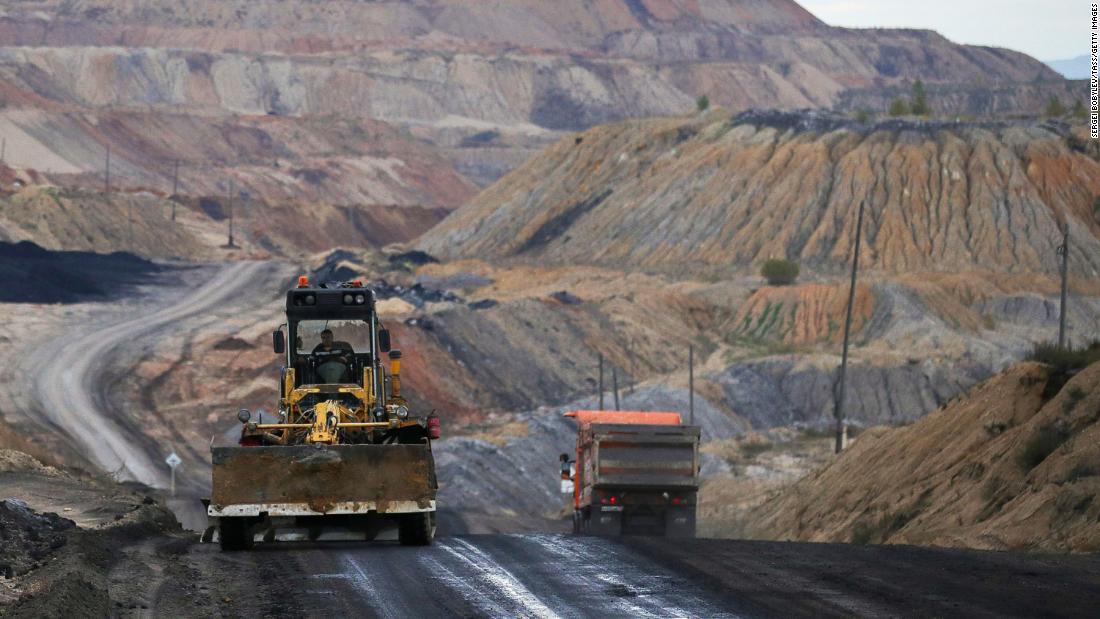
To limit global warming to 1.5 degrees Celsius (2.7 degrees Fahrenheit) -- which scientists say would avoid the most catastrophic impacts of climate change -- countries need to wind down their fossil fuel production by 6% every year between now and 2030, according to the 2020 Production Gap report.
Instead, countries are on track to produce an increase of 2% per year.
And as governments pour money into their economies in a bid to recover from the coronavirus pandemic, they risk locking the world into a climate disaster by investing more heavily in fossil fuel industries -- such as power, aviation, and car manufacturing, according to the new analysis from the Stockholm Environment Institute, International Institute for Sustainable Development (IISD), Overseas Development Institute (ODI), E3G and the UN Environment Programme.
"We find ourselves at a critical juncture at this time. While global fossil fuel production will dip sharply this year, government action and recovery measures are poised to shape our climate future," said Ploy Pattanun Achakulwisut, SEI scientist and co-author of the report.
"They could either return to pre-Covid production levels that lock-in severe climate disruption, or they could set the stage for a managed wind down of fossil fuel production."
How far out of line is fossil fuel production with climate goals?
The first Production Gap report last year found that governments are expected to produce 120% more fossil fuels by 2030 than what scientists say is permissible to keep the planet from warming 1.5°C (2.7°F) and 50% more than what we can burn to keep warming to 2°C (3.6°F). Those figures remain the same this year.
The report examines whether plans for future fossil fuel production are in line with global pledges to reduce the release of heat-trapping gases.
The findings suggest the actions of many countries don't match their words. While some say they plan to decrease their emissions, many are still investing in new fossil fuel projects.
This year, several major polluting countries pledged to reach net-zero emissions by 2050, including the United States, Japan and South Korea, with China pledging to go carbon neutral by 2060. But there is a long road to achieve that.
The report found that from now until 2030, the global production of coal would have to decline annually by 11%, along with a 4% yearly drop in oil output and a 3% fall each year in gas extraction.
Covid-19 lockdown measures have led to short-term drops in coal, oil and gas production this year but pandemic recovery funds are disproportionately bolstering the global fossil fuel industry, rather than clean energy.
G20 governments have committed more than $233 billion in Covid-19 measures to sectors responsible for fossil fuel production and consumption. That's compared to about $150 billion to clean energy projects, the report found.
While the report highlighted some positive areas -- such as Canada's commitment of $1.8 billion toward reducing methane emissions and cleaning up oil and gas wells -- other stimulus measures have given unconditional support to fossil fuel production without social or environmental conditions.
According to the report, they include tax cuts on fossil fuel imports in Argentina, equity and loan guarantees for the Keystone XL pipeline in Canada, a rebate on coal extraction revenue due to the Indian government, a temporary tax relief package for the oil and gas industry in Norway, and reductions in oil and gas royalty rates and the weakening of environmental regulations in the United States.
"This is money that is borrowed from future generations. And if we are not thorough with how this money is invested and we keep investing in fossil fuels, we're going to give our children not only a climate that is in worse shape, but also will have wasted money," said Niklas Hagelberg, coordinator of the UNEP's subprogram on climate change.
To meet the climate goals set out in the Paris Agreement, the report's authors say policymakers must reverse this trend. The world is now at a turning point, they say, and as countries recover and rebuild, the choice for governments is to further lock societies and economies into a high-carbon system, or "build back better" toward a healthier and more resilient future.
The authors propose several policy options to rein in production, such as ending government subsidies for fossil fuels, placing limits on production and ensuring stimulus funds go to green investments.
The report also proposes how the world can equitably transition away from fossil fuels and minimize social disruption. That includes supporting workers and communities affected by decarbonization, and providing job security, training, education, and social protection.
"This year's devastating forest fires, floods, and droughts and other unfolding extreme weather events serve as powerful reminders for why we must succeed in tackling the climate crisis," Inger Andersen, UNEP's Executive Director said in a statement.
"As we seek to reboot economies following the Covid-19 pandemic, investing in low-carbon energy and infrastructure will be good for jobs, for economies, for health, and for clean air."
"fuel" - Google News
December 02, 2020 at 09:01PM
https://ift.tt/36sXs78
We're at a turning point on climate change. But most countries are still choosing fossil fuels over clean energy, report says - CNN
"fuel" - Google News
https://ift.tt/2WjmVcZ
Bagikan Berita Ini














0 Response to "We're at a turning point on climate change. But most countries are still choosing fossil fuels over clean energy, report says - CNN"
Post a Comment